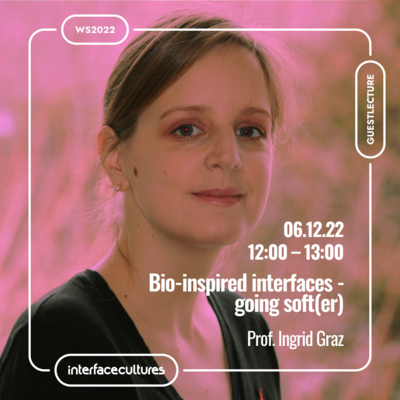Bio-inspired interfaces - going soft(er)
6. Dezember 2022, 12.00 bis 13.00 Uhr Kunstuniversität Linz, Domgasse 1, DO0327
Interface Cultures lädt zum Gastvortrag von Ingrid Graz.
Biological interfaces are key to life - they range from biomolecules, cells, biological tissue to living organism and are defined by their softness, to readily deform and rearrange. In contrast, interfaces in our modern life and technology are still hard and rigid, driven by properties of typical device materials. Emulating nature is a dream of scientists and has pushed the implementation of soft materials such as rubbers, foams, liquids and gels in novel electronic and robotic devices. These stretchable electronics and soft robotics draw inspiration from biological interface such as cells, tissue and living organisms not only regarding their mechanical properties but also their design. As a results stretchable electronics inspired by human skin with respect to deformabilty and sensing abilities, soft robotic elements modelled after plants such as mimosa and venus flytrap or animals such as the octopus became feasible. With approaches and technologies are mature for emulating soft interfaces, the time is ready to explore their potential for human-soft machine interactions.
Ingrid Graz is an associate professor at the Johannes Kepler University (JKU) Linz in Austria working on stretchable electronics and soft robotics. After receiving a Ph.D. (2006) in physics at JKU researching flexible polymer sensors, Ingrid spent 3 years in the Department of Engineering, University of Cambridge, UK. There she developed stretchable transistors and sensors. In 2011 she returned to JKU as an assistant professor and completed her habilitation on skin-inspired electronics in 2015. She has authored and co-authored over 40 peer-reviewed papers and is head of the Christian Doppler Laboratory for Soft Structures for Vibration Insulation and Impact Protection.

